Why BlackBerry Needs Android (and Android Needs BlackBerry)
BlackBerry is a great company with great products and great ideas. But BlackBerry is failing hard. And the reason is that BlackBerry’s model is obsolete.
Don’t look now, but it’s 2013. If your handset isn’t running iOS or Android, you will not succeed in the consumer smartphone market.
And succeeding is exactly what isn’t happening at BlackBerry. The company recently announced a quarterly loss of about $1 billion. They announced that 40% of BlackBerry employees will be laid off. They’ve put the company up for sale. They’re selling their jet.
It’s over, basically. But it doesn’t have to be.
What BlackBerry really needs is to become an Android-handset maker.
What BlackBerry Would Bring to the Android Universe
BlackBerry’s core competency is optimizing phones for fast, secure and reliable communication.
Most Android phones, especially the major ones, are general purpose smartphones optimized for entertainment and media. They’re consumer phones for media-consuming consumers.
But some people are people people. They crave that flashing red light on a BlackBerry phone that says a message has arrived. They want instant communication (via push, rather than sync or polling), and to type real messages fast, maybe even on a really good physical keyboard. (No, really. Lot’s of people want a physical keyboard instead of a larger screen — and smaller screens give you better battery life, too.) And they want the privacy and security of sending what is essentially SMS but not associated with a phone number, or essentially IM but over a more-secure network.
What BlackBerry should be focusing on is satisfying actual demand. Specifically, BlackBerry should be building an NSA-proof messaging and email service. BlackBerry is a better position than just about anyone to develop a highly secure, private messaging system that can’t be hacked by the NSA, by the Chinese government or by Eastern European organized crime syndicates.
A truly secure communication system, however, will require tight integration between hardware and software. And that’s why releasing BBM on iOS and Android won’t quite cut it.
If BlackBerry became the Android phone that offered total communication security and privacy, they would gain not only a huge following in the Android consumer community, they would start winning back the business they lost to iPhone in governments, military organizations and enterprises.
Everybody whines about NSA privacy violations. BlackBerry could do something about it.
Here’s another thing BlackBerry-on-Android would bring to the Android universe: BlackBerry users. BlackBerry has won some super loyal fans over the years. I suspect that many of those loyal fans will switch to iPhone when BlackBerry dies.
What Android Would Bring to BlackBerry
Apps. In fact, it’s the relative lack of app options that is killing BlackBerry today.
But even more than apps, BlackBerry needs the world of services that some apps can offer, including Google services and random cloud services.
Mostly, however, Android would bring BlackBerry back to life.
The path forward for BlackBerry is very clear. Create a mission to become the most secure and best Android communication device possible.
If BlackBerry does that, they will succeed. If they don’t, they’re done.



